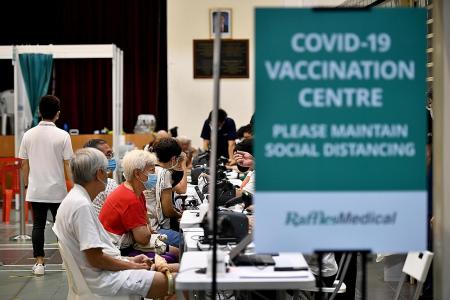Singapore doing well with its pace of vaccination: Expert
Process in good stead despite supply limits, though some feel it could have been faster
Singapore kicked off mass vaccination at the start of the year but lags behind countries such as the United States, the United Kingdom and Israel in vaccine roll-out because of supply constraints, experts said.
Slightly more than one-third of the population in Singapore has received at least one dose of a Covid-19 vaccine, with about one-quarter of them fully vaccinated.
This places it behind countries that have managed to give at least one dose to nearly or more than half of their populations, which has allowed them to gradually ease Covid-19 restrictions even as the threat of new variants looms.
Still, Singapore is among the top 25 countries in the world in terms of Covid-19 vaccination, said Associate Professor Hsu Li Yang, vice-dean of global health at the National University of Singapore's Saw Swee Hock School of Public Health.
He said the speed of vaccination should pick up once there are "adequate continuous supplies" of approved vaccines.
"Every country would love to be vaccinating faster but obviously, globally, demand outstrips supply,” said Professor Dale Fisher, a senior consultant in infectious diseases at National University Hospital.
He said Singapore has a steady supply and is in a good place as all long-term residents will have the opportunity to be vaccinated in the next few months.
Some, however, said the process could have been faster.
“Ideally, we should have vaccinated more people by now – perhaps at the level of other small highincome countries such as Israel or the United Arab Emirates,” said Professor Paul Tambyah, president of the Asia-Pacific Society of Clinical Microbiology and Infection.
Based on what he has gleaned from official reports, the main constraint is the lack of vaccine supply, he said, noting that the distribution seems to be fairly efficient.
“The vaccines have proved effective in reducing the current wave of infections, but it is possible that we would have had even fewer cases if we had a higher rate of vaccination.”
The reasons for the supply constraints here are unclear, but in Israel, for instance, inoculation has been speedy as the country paid a premium and struck a deal with Pfizer to supply the vaccine-maker with data from its vaccination drive.
The Singapore Government said last week that it would stretch out the interval between doses to six to eight weeks, to ensure nearly everyone – or 4.7 million people – gets at least one shot by early August.
Although new data from a single British study showed that protection against the B1617 variant after a single dose of the Pfizer-BioNTech vaccine was only 33 per cent, “this is better than nothing”, said Prof Hsu.
Get The New Paper on your phone with the free TNP app. Download from the Apple App Store or Google Play Store now



